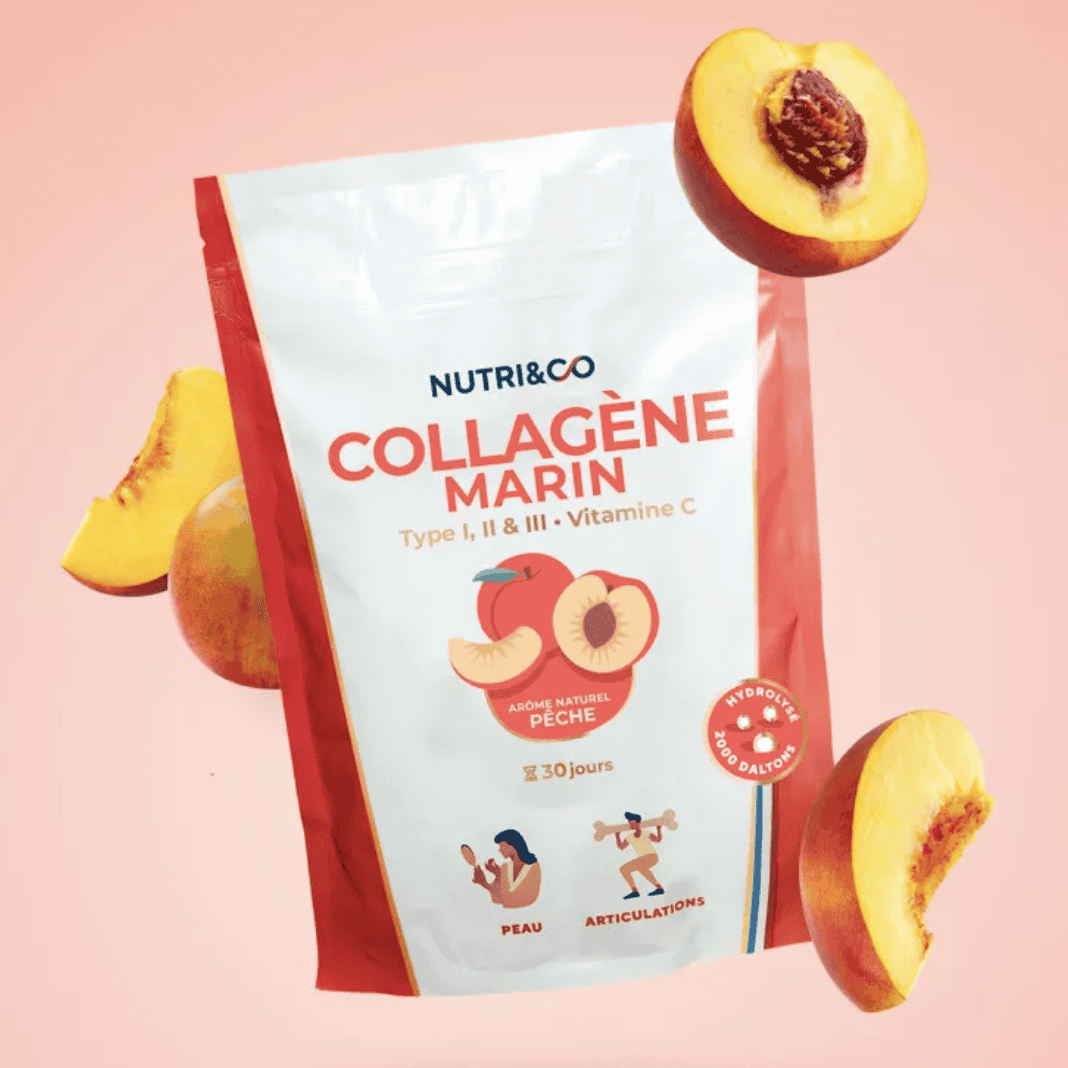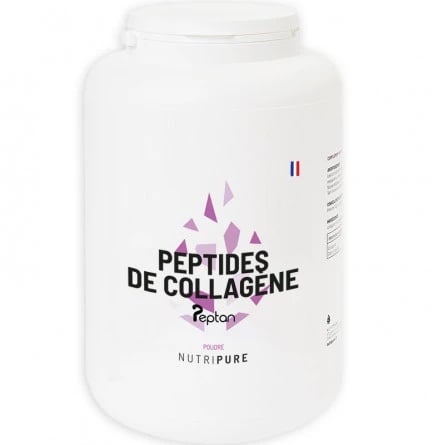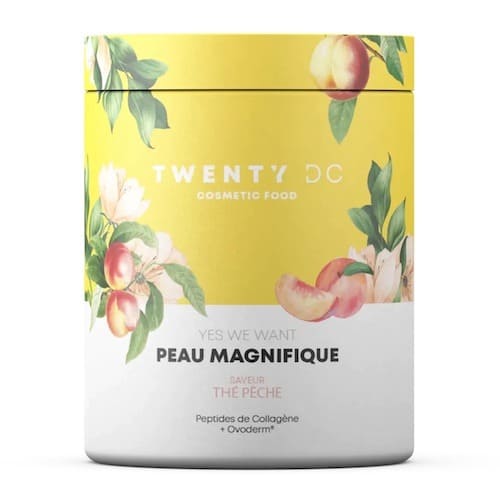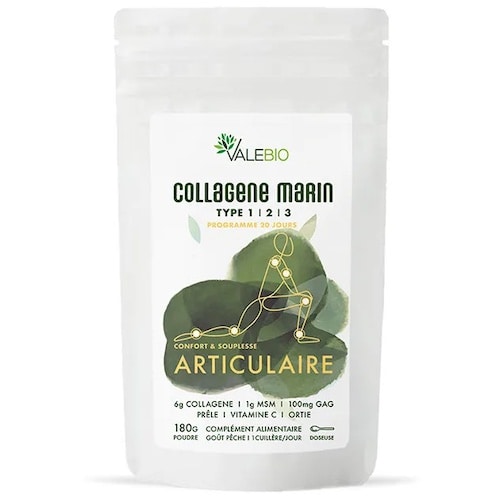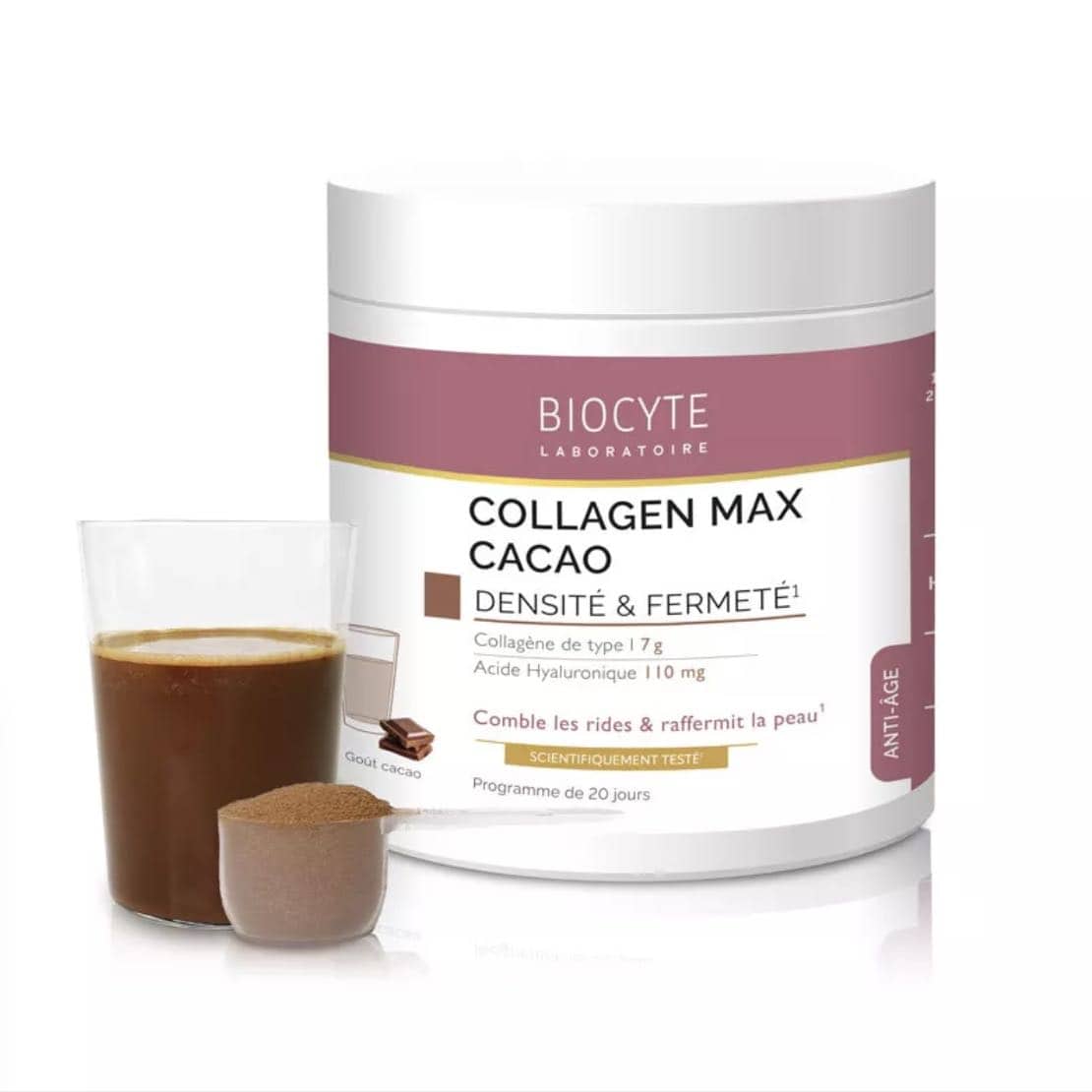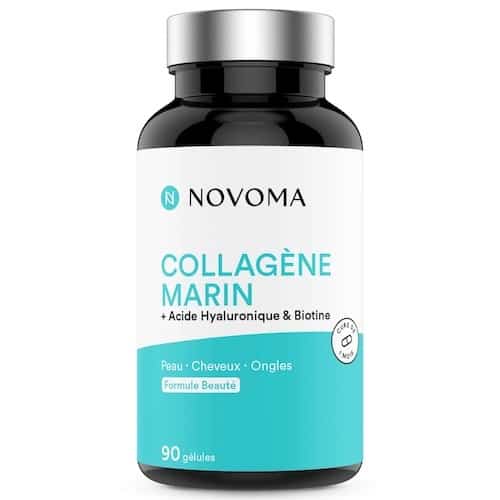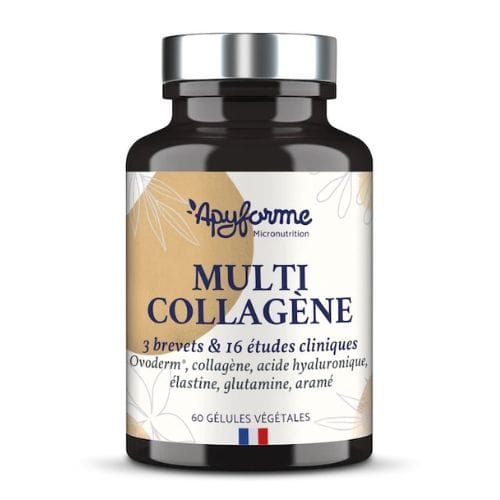You’ve probably noticed that many collagen supplements have appeared on the market. How do you find your way through an ever-growing range of options? Géraldine Dubois, a physician and nutrition expert, analyzed and compared 15 products.
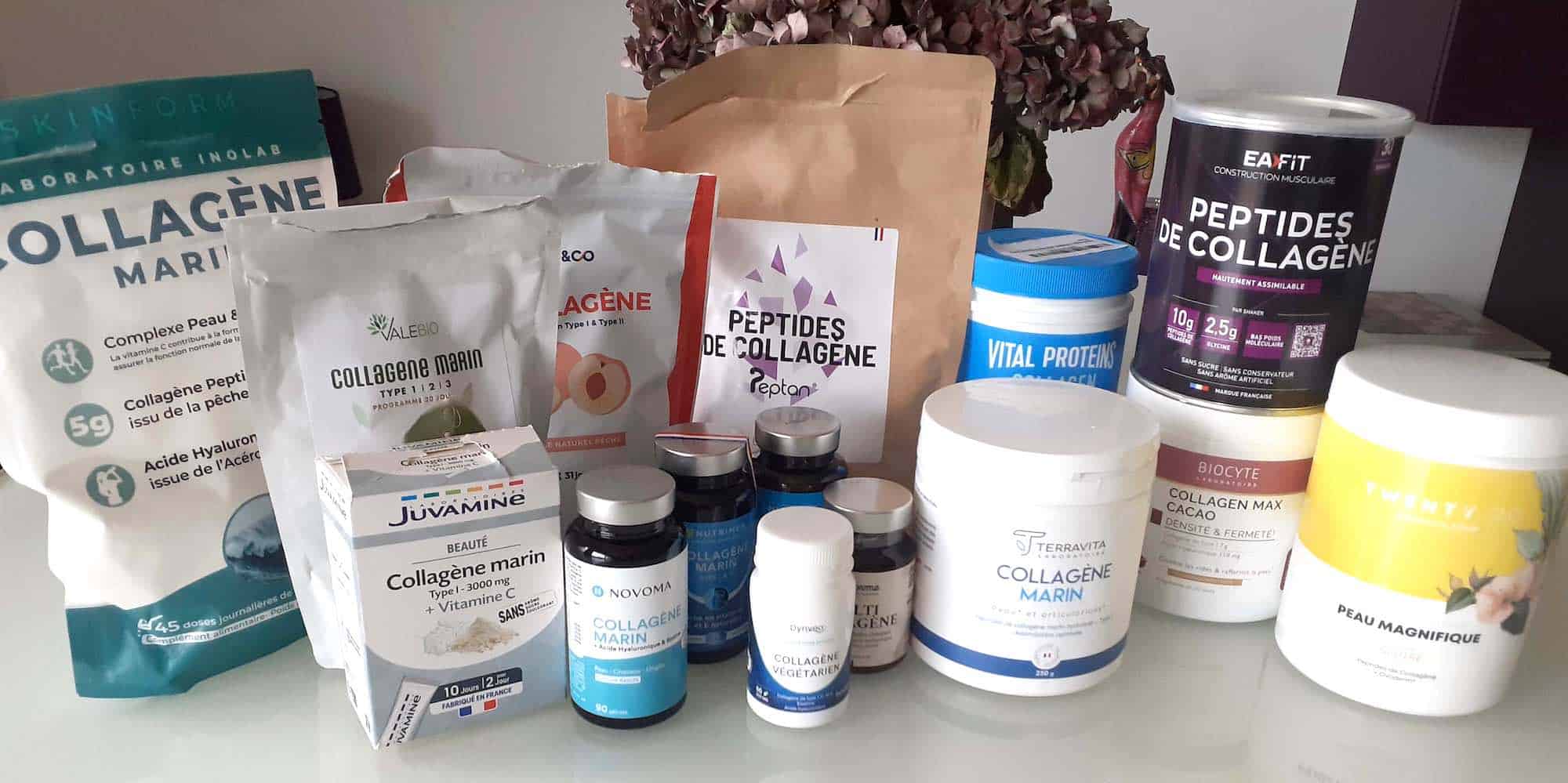
Collagen is a major component of many tissues in the human body (skin, cartilage, tendons, blood vessels, muscles…) and contributes significantly to their architecture by providing strength.
Collagen is a large structural protein and by itself accounts for about 30% of the body’s proteins.
In the skin, its presence influences density, hydration, and resilience. With age, the decline in collagen production leads to changes such as loss of skin elasticity and firmness.
Multiple publications1 have demonstrated the anti-aging benefits of collagen taken orally for the skin2 (combating skin sagging, filling fine lines, and reducing deep wrinkles).
Another main indication for a collagen regimen concerns joint comfort. Collagen supports the cohesion and elasticity of cartilage by contributing to its renewal and helping to counter its loss.
Taking collagen leads to gains in flexibility and mobility, as well as a reduction in pain3. Osteoarthritis and osteoporosis are two conditions in which collagen has shown a beneficial effect.
Brands evaluated : Apyforme, Biocyte, Dynveo, Eafit, Juvamine, Novoma, Nutralie, Nutri&Co, Nutrimea, Nutripure, Terra Vita, Twenty DC, Valebio, Vital Proteins
We evaluate all dietary supplements independently. If you click on one of the links provided, we may receive a commission, without this affecting the price or the ranking.
Summary of my selection
# Best marine collagen
> Collagen – Nutri&Co
# Best bovine collagen
> Collagen peptides – Nutripure
# Best collagen for skin
> Beautiful skin collagen – Twenty DC
# Best collagen for joints
> Joint collagen – Valebio
Methodology
I took a close look at 15 of the best-selling collagen supplements on the internet.
I gathered the supplement details from brand websites, from product packaging, and by contacting customer service directly when information was missing.
I scored and compared them according to 5 criteria, then selected the best products in 7 categories.
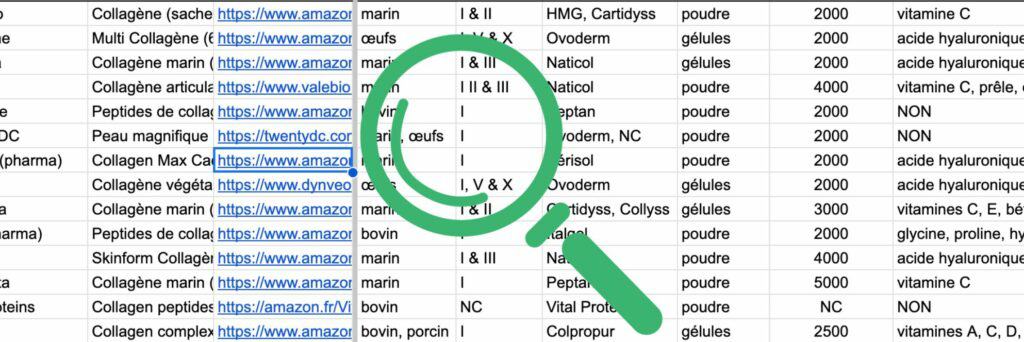
→ Access my complete comparison table here (Google Sheet)
1. Nutritional value
To evaluate the nutritional value of collagen, I relied on:
The source and type of collagen
Collagen is primarily extracted from cattle, pigs, fish, and also from eggshell membrane.
There are several types of collagen distributed in various proportions across tissues. Types I, II, and III are the main ones.
The molecular weight
Collagen is a large protein that cannot be absorbed by the body as such. It therefore must be hydrolyzed, that is, cut into small pieces (peptides), to cross the digestive barrier.
A low molecular weight (< 5000 Da) promotes the product’s bioavailability. The lower the collagen’s molecular weight, the better it is absorbed.
Quality and the manufacturer’s patent
To preserve all the qualities of collagen, the hydrolysis method used must be gentle. The extraction and hydrolysis processes used are protected by a patent provided by the manufacturer. They must specifically indicate the absence of heavy metals, solvent residues, and other contaminants.
A quality label is guaranteed by product certifications and testing (for example Peptan®, Naticol®, Verisol®…. ) to attest to the safety and effectiveness of collagen.
Other active ingredients
The presence of vitamins, trace elements, or hyaluronic acid can complement certain products for a more complete formula.
2. Safety
To assess the safety of the different collagens, I took into account 3 sub-criteria:
The origin of the raw material
Most of the collagens on the market are of animal origin. It is important to ensure the origin of the raw material from which they are extracted.
Some brands do not always disclose it, while others put it front and center. I had to contact some brands to get clarification.
The presence of additives and sweeteners
The fewer there are, the better! An ingredient list that’s too long is generally not a guarantee of quality. Flavored formulas often contain more ingredients that warrant a careful look.
Scientific support
Some brands have conducted efficacy tests with their own product. But it is mainly the studies supporting the various patents held by collagen manufacturers that are highlighted.
3. Pleasure
The notion of enjoyment regarding a product is inevitably more subjective. Moreover, this aspect was only tested on powdered collagens (capsules being generally more neutral).
I considered:
The powder’s solubility
I mixed the recommended dose of the 10 “powder” formulas from the selection into 200 ml of water. Some recommend simply using a glass of water or a hot or cold beverage, others a shaker or even a blender! I observed how well the powder dissolved, how quickly it produced a uniform mixture, and whether there were lumps.
The taste
I evaluated the product’s texture during tasting, its aroma, and the intensity of its flavor.
4. Brand awareness
To assign a score to the brand’s reputation, I relied on the company’s longevity and the size of its Instagram community.
I also factored in the reviews displayed on Amazon (when the products were sold there) and on review sites such as Trustpilot or Avis Vérifiés.
5. Packaging
The packaging of the products tested is recyclable. Some brands also use recycled materials to make the container.
On a necessarily more subjective note, I also took into account the design, as well as the content and clarity of the labels. I also assessed the practicality of handling collagen powders (the closure of the canister or pouch, and the presence of a measuring scoop).
Best collagens: my opinion
# BEST MARINE COLLAGEN
Nutri&Co
Pros
- Two types of marine collagen
- Contains vitamin C
- Reliable patented manufacturing processes
- Subtle but nice peach flavor that lets you take it with just water
- Brand recognition
- Fair price
Cons
- Moderately dosed (5.5 g per serving)
Nutri&co was created in 2017 by Édouard Fornas in Aix-en-Provence. This brand has seen strong growth. Thanks to quality products, it has become a leading player in nutraceuticals.
Nutri&co’s collagen is a marine collagen powder available in 3 flavors (peach, cucumber-mint, cocoa). The indication is for the skin and joints.
The marine collagen peptides are type I and II, sourced from controlled fisheries. The molecular weight is low for optimal absorption.
It is recommended to take the equivalent of 2 scoops per day (6 g in total), which provide 5.5 g of patented type I and II collagen (HMG® 5 g and Cartidyss® 500 mg).
It is complemented by 24 mg of vitamin C per serving and a peach flavor. And that’s it!
The test focused on the peach version. The powder mixes well. Upon tasting, there is a subtle, pleasant peach flavor with no fishy taste.
For a one-month course, expect to pay €24.90, which is a fair price compared to the rest of the selection.
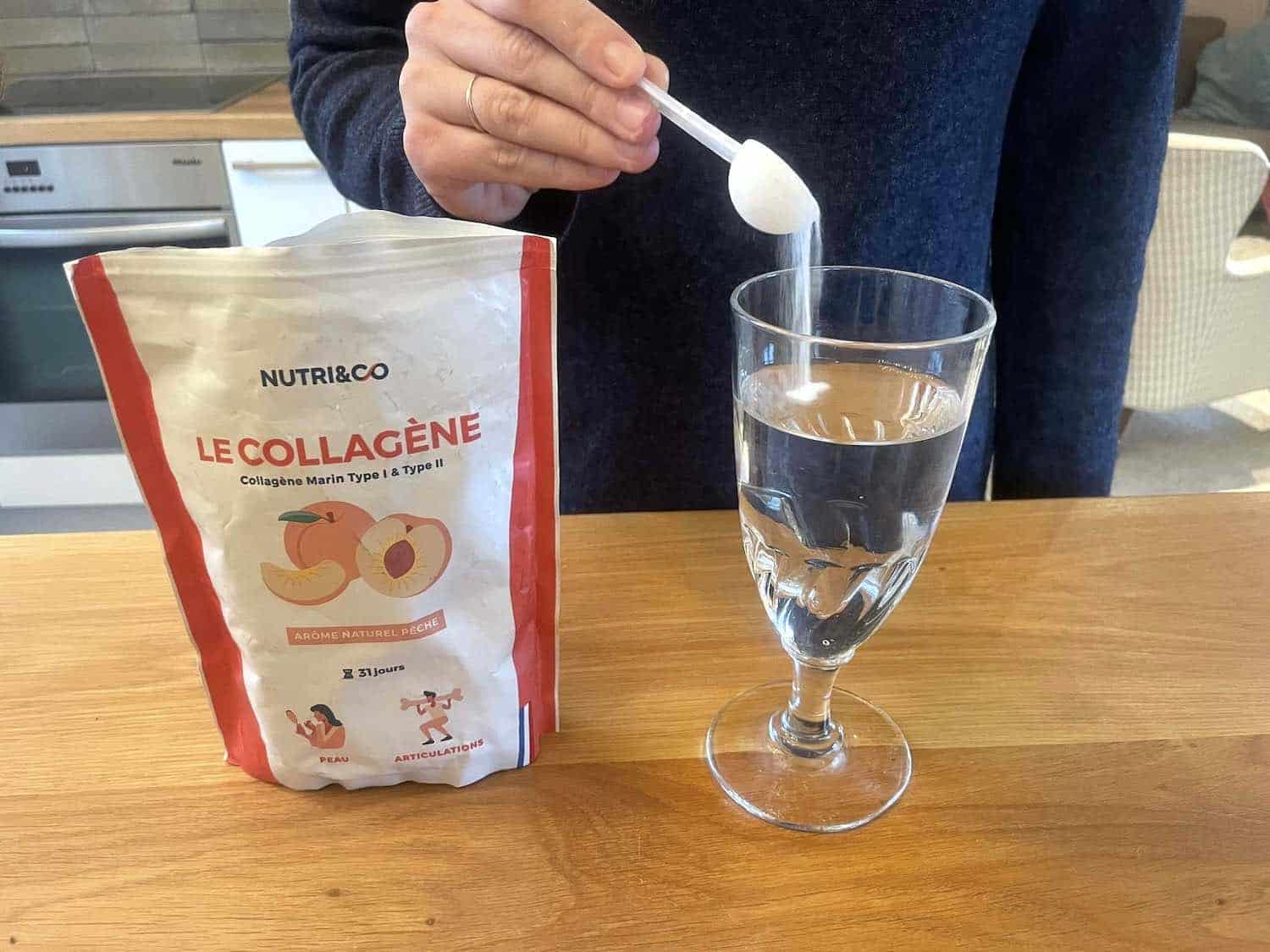
# BEST BOVINE COLLAGEN
Nutripure
Pros
- Only one ingredient in the unflavored version
- Good collagen dosage
- Well-known brand
- Reasonable price
- Neutral taste
Cons
- Additives in the flavored versions
The brand was created by the Carrio brothers in 2017. Their specialty is sports nutrition. Their stated aim is to offer formulas that are as natural as possible. The brand has a good reputation, particularly within the sports community.
Nutripure collagen peptides, in its unflavored version, has the advantage of containing only one ingredient: the patented Peptan® collagen peptide. This collagen, of bovine origin, is patented by a company with a global presence. It is stated that the raw material comes from the European Union.
Nutripure recommends taking 10 to 20 g of collagen per day, which is 1 to 2 scoops.
There is a wide selection of flavored varieties (6 in total). Some are ready-made formulas (chocolate and lemon), others are sold with a flavoring to mix in. The flavored versions of the product contain some additives and sweeteners, which is why I don’t recommend them.
The unflavored version dissolves very well and has no noticeable taste.
The price for a one-month course at 10 g per day is on the lower end compared to the selection.
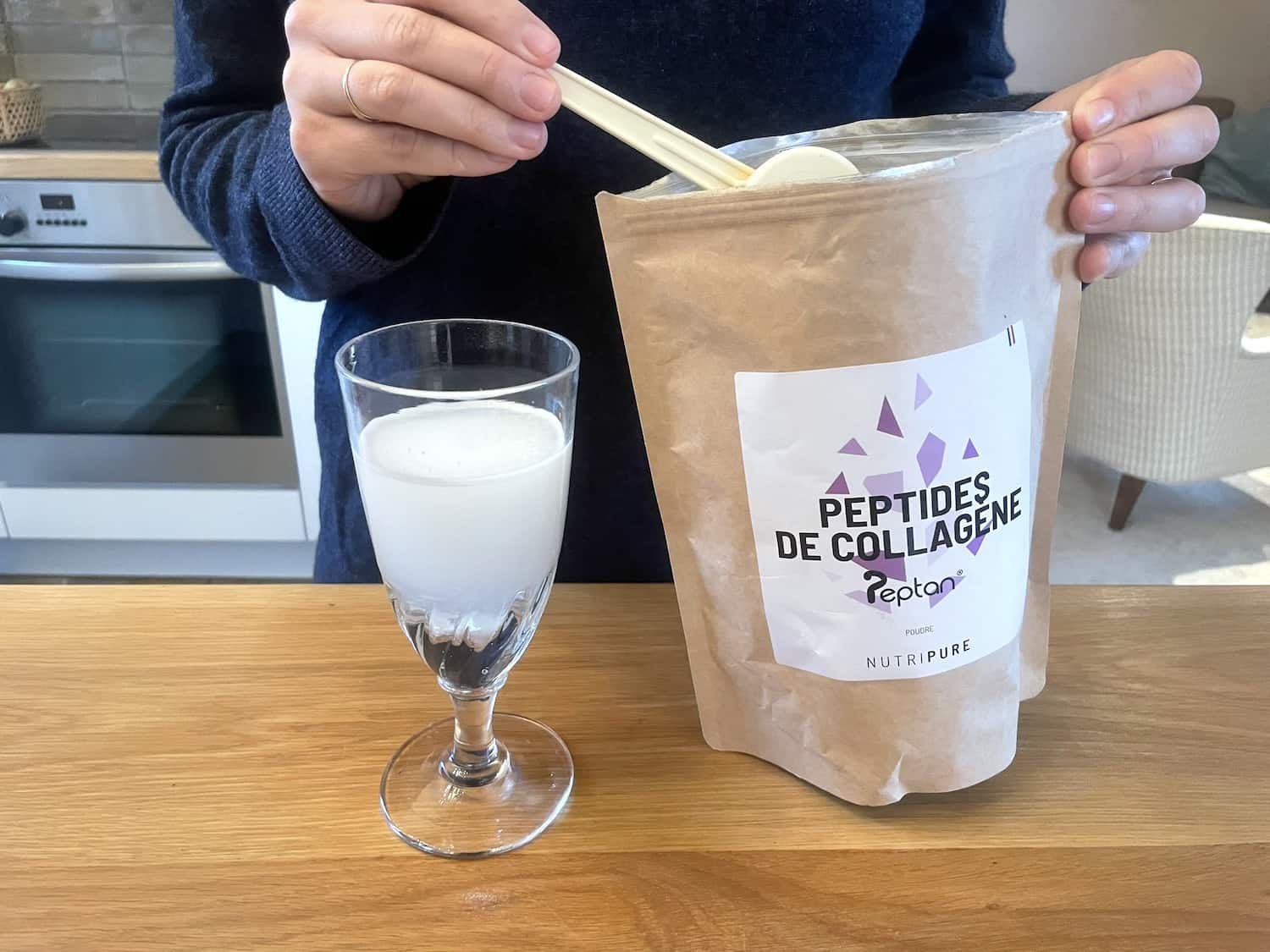
# BEST COLLAGEN FOR SKIN
Twenty DC
Pros
- Good collagen dosage
- Uses two forms of collagen: marine and eggshell membrane
- Nice packaging
Cons
- Flavored versions with additives: not recommended
- Lack of information on the precise origin of the marine collagen. The collagen manufacturer is not mentioned
- A bit expensive
Twenty DC is a brand specializing in collagen. It was founded by two entrepreneurs with experience in sports nutrition.
Twenty DC comes in a box with a nice design and color scheme.
I tested the unflavored version.
The formula consists of two types of collagen: marine and eggshell membrane, which contains collagen (Ovoderm®). There are no other active substances. However, the eggshell membrane naturally contains small amounts of hyaluronic acid, chondroitin, and elastin.
The origin of the marine collagen is not mentioned, nor the extraction process. I contacted the brand’s customer service to get more detailed information. In their reply, they told me that Twenty DC works with trusted suppliers, that the formulations undergo thorough testing, and that the marine collagen used is of high quality.
Note that there are 2 flavored versions. I don’t recommend them because, in my opinion, they contain too many additives and sweeteners.
The recommended daily dose is 10 g of collagen (9.85 g of marine collagen and 150 mg of Ovoderm® per scoop). The smell in the container isn’t very pleasant, but upon tasting, the flavor is truly neutral. The powder takes a little time to dissolve completely.
Twenty DC highlights a double-blind, randomized laboratory study conducted with 50 women who completed a 20-day course of Collagène Peau Magnifique. The results indicate firmer skin (+21%), better hydration (+24%), and smoother skin (+84%).
A one-month course costs a little over €50, which is relatively pricey compared with the rest of the selection.
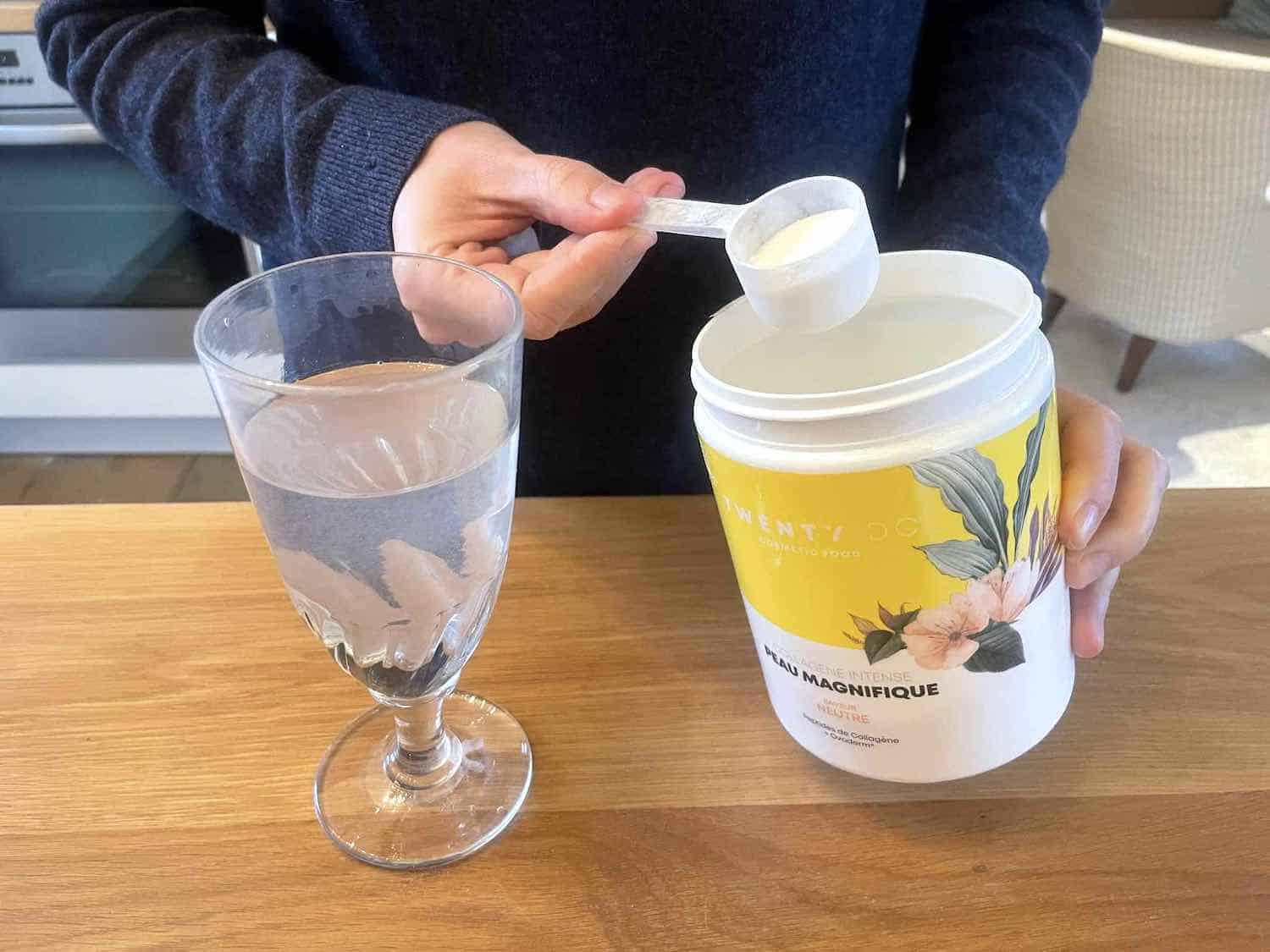
# BEST COLLAGEN FOR JOINTS
Valebio
Pros
- Very comprehensive for joint health
- 3 types of collagen
- Laboratory that prioritizes transparency
- Naticol® collagen of recognized quality
Cons
- High cost (even if the presence of other ingredients may justify the price)
Valebio is a French brand founded in 2015 that champions nutraceuticals in the service of health, beauty, and well-being. The company emphasizes its commitment to quality and expertise, and respect for the environment.
The collagen in this joint-support product is of marine origin. It includes types I, II, and III, and is Naticol®-certified. This collagen manufacturer enjoys an excellent reputation for its range of naturally sourced marine collagen peptides produced using a gentle hydrolysis process.
Valebio’s Joint Marine Collagen contains a genuine complex aimed at joint support. In addition to vitamin C, it includes several complementary substances with regenerative and anti-inflammatory actions: MSM (methylsulfonylmethane), GAG (glucosamine and chondroitin), horsetail, and nettle.
The powder tends to clump, and you need to mix well so the lumps disappear. The tangy flavor is fairly subtle and pleasant, but I still notice a slight fishy aftertaste at the end.
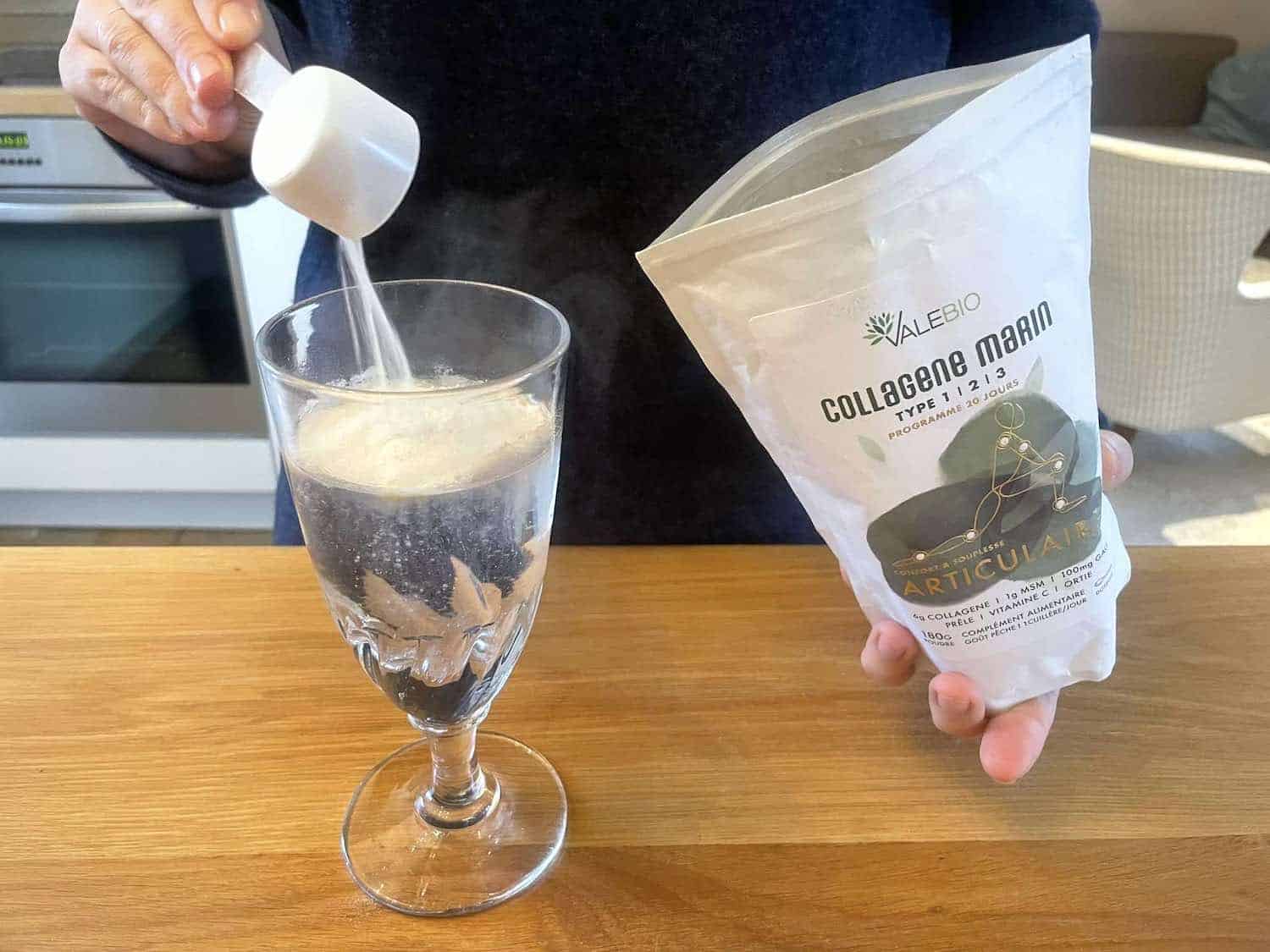
# BEST COLLAGEN AND HYALURONIC ACID
Biocyte
Pros
- Good level of hyaluronic acid
- Pleasant chocolatey taste
Cons
- Presence of additives in the chocolate-flavored formula
- EU and non-EU origin of the raw materials, with no further details
Biocyte is a French nutricosmetics brand created in 2006 on the French Riviera. The dietary supplements are formulated for beauty, anti-aging, weight loss, and health.
The collagen used in Collagen max cacao is type I marine collagen from the manufacturer Vérisol®. The indicated daily serving contains 7 g of collagen.
The fish used by the manufacturer Vérisol® comes from within the European Union (EU) as well as from outside the EU, with no further details provided. Vérisol® is a collagen that has been the subject of a substantial number of scientific studies.
Vitamin C and hyaluronic acid are added to this collagen. Biocyte has the highest concentration of hyaluronic acid among the products in the selection, namely 110 mg per serving.
The formula contains steviol glycoside, a natural sweetener, as well as several additives (maltodextrin, xanthan gum, salt).
The price is relatively high, since a one-month course costs €55.50.
The chocolatey taste is pleasant, even though I find the texture a bit grainy.
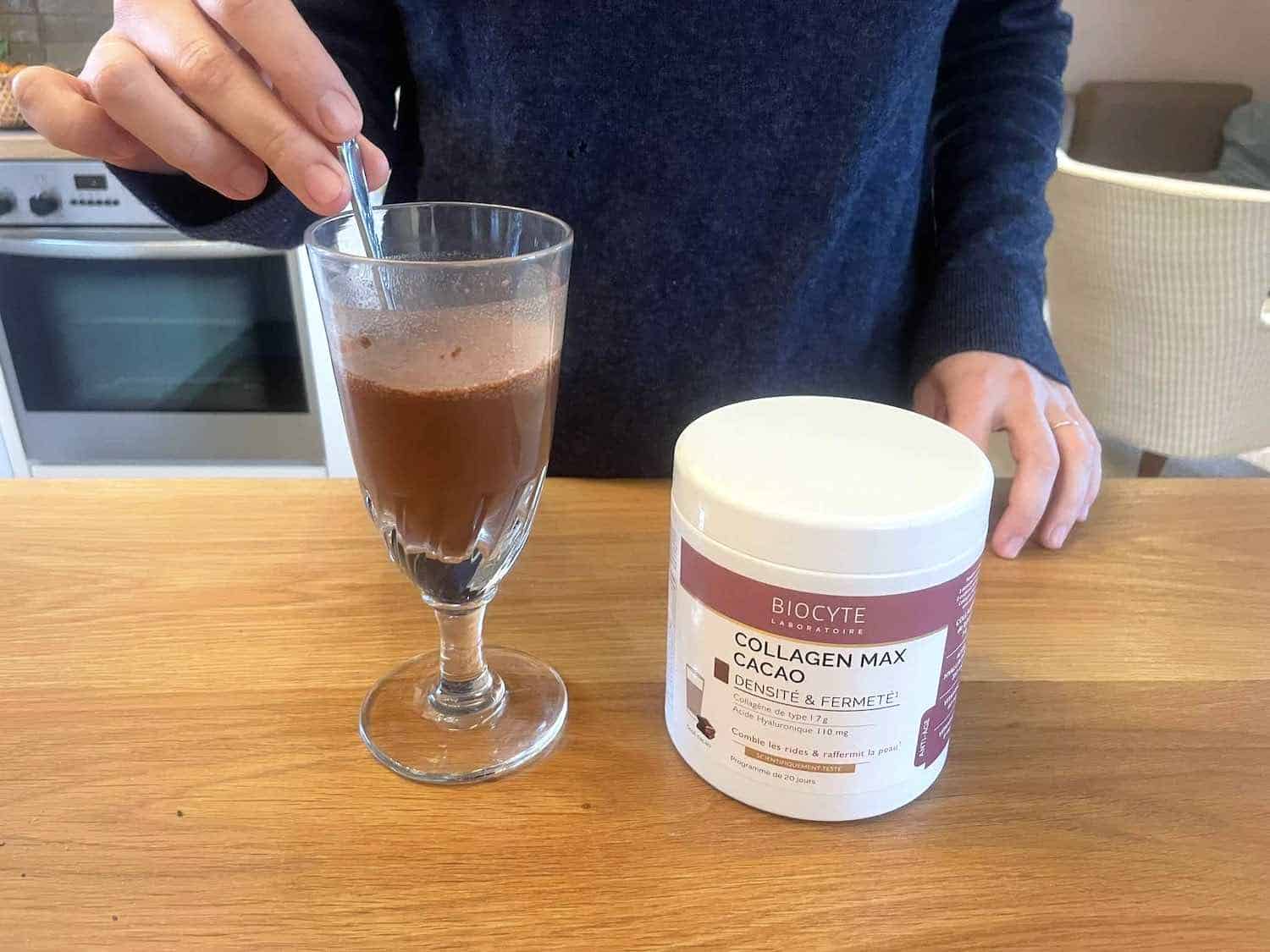
# BEST COLLAGEN IN CAPSULES
Novoma
Pros
- Multiple accompanying vitamins and hyaluronic acid
- Reasonable price
- Recycled and recyclable bottle
Cons
- Low collagen dosage (specific to the capsule version)
Novoma is a French brand founded in 2012. Formerly named Nutrivita, the company was created by two people from Gers who wanted to offer high-quality dietary supplements.
Novoma’s Marine Collagen is composed of two types of collagen (I and III) with a low molecular weight, Naticol®-patented. This ingredient is of French origin; it is extracted from wild-caught fish and carries a sustainable fishing certification.
The formula is designed to provide beauty benefits for the skin, hair, and nails.
This purpose is reflected in the composition of the capsules by a broad range of vitamins (including Quali®-C vitamin C), as well as hyaluronic acid and zinc.
The recommended daily dose is 3 capsules, totaling 1 g of collagen and 100 mg of hyaluronic acid. This is a low collagen dose. The brand also sells a marine collagen powder with a higher dose.
The cost of the bottle for a 1-month course is very reasonable (€19.9). Note that it’s a bottle made from recycled material, an eco-friendly plus.
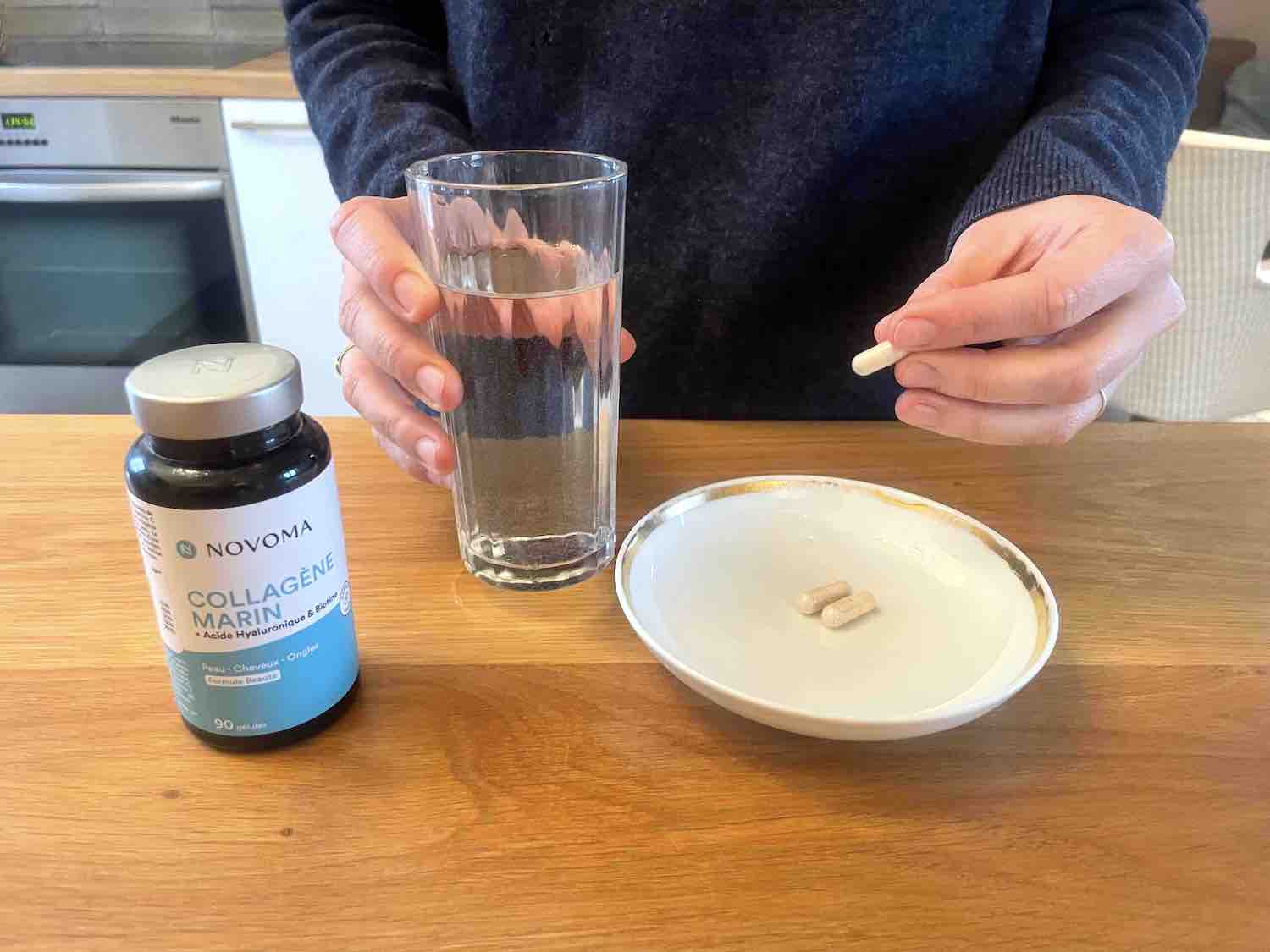
# BEST VEGETARIAN COLLAGEN
Apyforme
Pros
- One of the only formulas strictly suitable for vegetarians
- Ethical and environmentally friendly laboratory
Cons
- Low collagen dosage
- Little documentation on this type of collagen extracted from eggshell membrane
Apyforme is a French brand founded in 2007 and based in the Auvergne-Rhône-Alpes region.
The formula is very light in collagen: only 0.9 g of Ovoderm® collagen, which is type I collagen.
The active ingredients are extracted from eggshell membrane, without chemical solvents. Its composition naturally includes elastin, chondroitin, and hyaluronic acid. Of course, the capsules are guaranteed to contain no ingredients of animal origin.
The brand highlights that Ovoderm® collagen has been patented three times and that its action has been validated 16 times by clinical studies that seem to support a daily intake of 300 mg. However, so-called vegetarian collagens are still underrepresented on the market and have benefited from fewer scientific publications than collagens of animal origin.
The regimen, described by the brand as intense, involves taking 3 capsules per day for 14 days, then 2 capsules per day for 1 month. The cost is at the lower end of the selection (€24.90).
This collagen is suitable for people following a strict vegetarian diet.
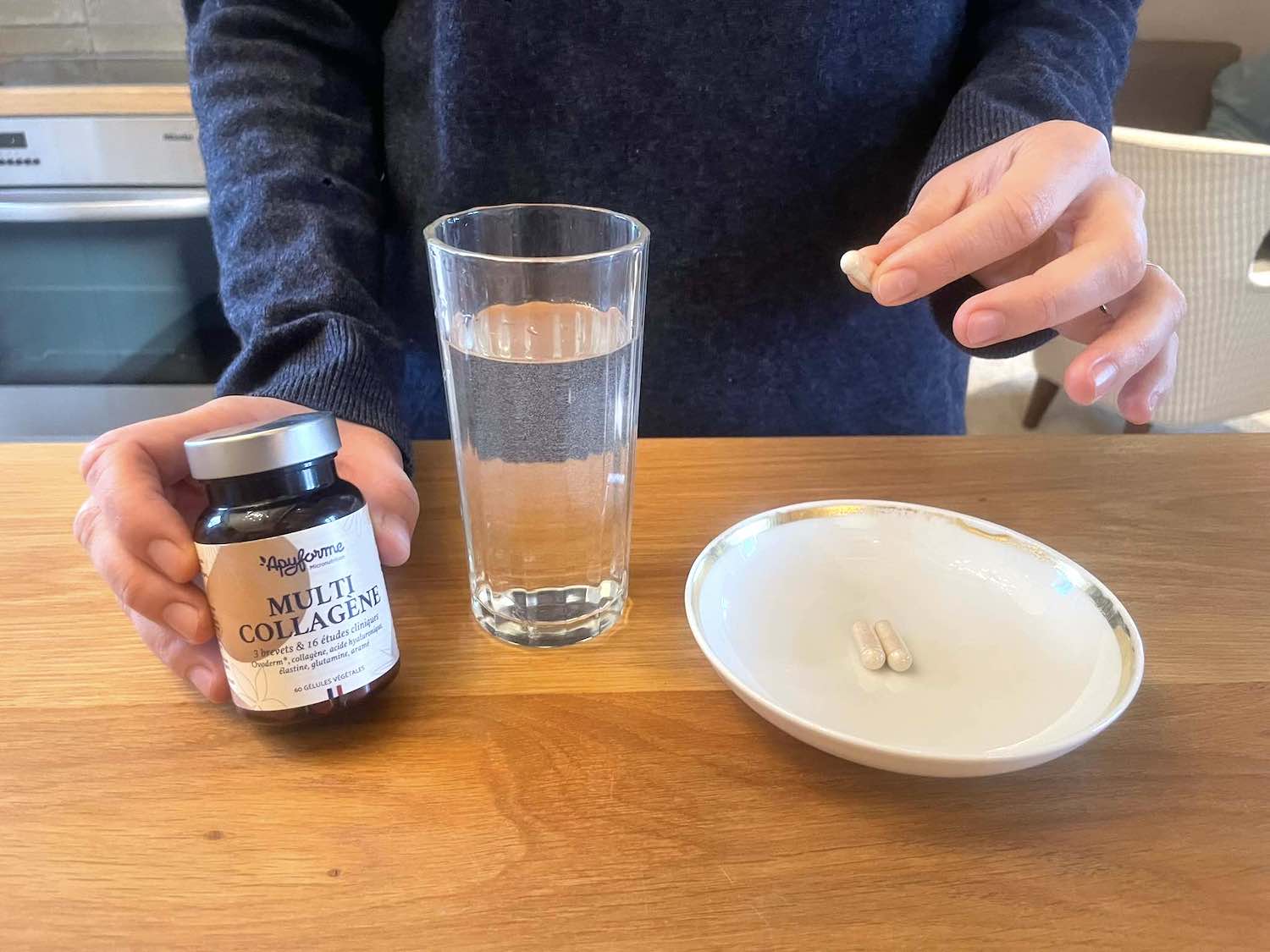
Complete comparison
| NOTE | Nutrition | Sécurité | Plaisir | Marque | Pack | |
|---|---|---|---|---|---|---|
| #1 – Nutri&co | 4.4 | 4 | 5 | 4 | 5 | 4 |
| Apyforme | 4.0 | 4 | 5 | x | 3 | 4 |
| Novoma | 4.0 | 3 | 5 | x | 4 | 4 |
| Valebio | 4.0 | 4 | 4 | 4 | 4 | 4 |
| Nutripure | 3.8 | 4 | 3 | 4 | 4 | 4 |
| Twenty DC | 3.8 | 4 | 4 | 4 | 3 | 4 |
| Biocyte | 3.6 | 3 | 3 | 4 | 4 | 4 |
| Dynveo | 3.5 | 3 | 4 | x | 3 | 4 |
| Nutrimea | 3.5 | 3 | 4 | x | 3 | 4 |
| Eafit | 3.4 | 4 | 2 | 3 | 4 | 4 |
| Terra Vita | 3.4 | 4 | 4 | 3 | 3 | 3 |
| Vital Proteins | 3.0 | 3 | 2 | 3 | 3 | 4 |
| Nutralie | 2.5 | 3 | 2 | x | 2 | 3 |
| Juvamine | 2.2 | 1 | 1 | 4 | 2 | 3 |
→ Access my full comparison table here (Google Sheet)
Frequently Asked Questions (FAQ)
Why take collagen?
Natural collagen production declines with age. Scientific studies estimate that we lose 1% of collagen per year starting at age 40. Around age 80, the body’s collagen production decreases by about 75% compared with that of young adults. Supplementation is recommended to compensate for this loss.
Which collagen is best, marine or bovine?
Collagen peptides can be extracted from different sources, the most common being bovine and fish (known as marine collagen). It appears that marine collagen is more bioavailable than bovine collagen. However, research teams do not always agree on this. In addition, many factors can influence how well collagen is absorbed.
How long does a collagen regimen last?
The brands tested most often recommend a one-month regimen, or even a bit less (20 days). In scientific literature reviews, the average study duration on collagen supplementation is generally 8 to 24 weeks, depending on the indication. There are no clear, official recommendations. Nevertheless, it seems worthwhile to do regular regimens starting at age 25, given how collagen production changes with age. For the same reasons, the frequency of regimens should increase over the years. It is necessary to take individual factors into account, because needs depend on one’s underlying condition and medical history and must be determined on a case-by-case basis.
Where can you find collagen in your diet?
Collagen in its raw form is found in animal-derived products. Marrow bones, for example, are rich in it and can be used to make broth to promote its extraction. This is a good source of type I collagen. Chicken skin and sardines are also good sources of collagen. In fish, it is found mainly in the skin, bones, and scales.
How much collagen should you take per day?
Dosage recommendations are difficult to specify. Studies show wide variation in both the dose and the duration of collagen administration. For skin, some studies suggest that a dose of 2.5 g/day is sufficient to provide benefits. For joint benefits, a daily intake of 5 g of collagen over 12 months already appears to be beneficial for bone mineral density and certain bone markers in a group of postmenopausal women. Nevertheless, 10 g per day remains the most commonly reported daily dose in studies, especially for joint-related effects (pain associated with osteoarthritis or in cases of osteoporosis).
What is the best collagen brand?
Les marques qui commercialisent du collagène font appel, la plupart du temps, à des fabricants labellisés qui extraient et hydrolysent le collagène pour le rendre facilement assimilable. Les meilleures sont celles qui offrent le plus de transparence sur l’origine de la matière première, les modalités d’extraction et d’hydrolyse du collagène. Les principaux fabricants brevetés sont Peptan®, Naticol®, Verisol® et Cartidyss®. La transparence et la qualité des études menées sur les produits sont un gage de qualité. Selon notre comparatif, les meilleures marques de collagène sont Nutri&Co, Nutripure, Valebio, Apyforme, Twenty DC, Biocyte et Novoma.
Should you take type 1 collagen or type 2?
Twenty-eight types of collagen have been identified, present in very different proportions across the tissues of the human body. More than 90% of collagen is type I. It is mainly located in the skin (in the dermis) but is also found in most tissues. Therefore, for an overall effect, it’s best to prioritize this type of collagen. Type II collagen is more specific to cartilage. This is the one to favor for the joints. Type III is present in the walls of blood vessels and in muscles, and is also found in the skin, in smaller amounts.
Should you take collagen or hyaluronic acid?
Collagen and hyaluronic acid are both present within the skin’s extracellular matrix. Their effects are complementary. Collagen fibers form a strong network that provides the skin with support and resilience. Hyaluronic acid is a key molecule for maintaining skin hydration because it can hold 1,000 times its weight in water. These two substances therefore make a winning duo for maintaining the skin’s appearance and texture.
References
1. Choi FD, Sung CT, Juhasz MLW, Mesinkovsk NA. Oral Collagen Supplementation: A Systematic Review of Dermatological Applications. J Drugs Dermatol JDD. 2019;18(1):9-16.
2. Bolke L, Schlippe G, Gerß J, Voss W. A Collagen Supplement Improves Skin Hydration, Elasticity, Roughness, and Density: Results of a Randomized, Placebo-Controlled, Blind Study. Nutrients. 2019;11(10):2494. doi:10.3390/nu11102494
3. Khatri M, Naughton RJ, Clifford T, Harper LD, Corr L. The effects of collagen peptide supplementation on body composition, collagen synthesis, and recovery from joint injury and exercise: a systematic review. Amino Acids. 2021;53(10):1493-1506. doi:10.1007/s00726-021-03072-x
4. Varani J, Dame MK, Rittie L, et al. Decreased Collagen Production in Chronologically Aged Skin. Am J Pathol. 2006;168(6):1861-1868. doi:10.2353/ajpath.2006.051302
5. Baumann L. Skin ageing and its treatment. J Pathol. 2007;211(2):241-251. doi:10.1002/path.2098
6. Davison-Kotler E, Marshall WS, García-Gareta E. Sources of Collagen for Biomaterials in Skin Wound Healing. Bioengineering. 2019;6(3):56. doi:10.3390/bioengineering6030056
7. Proksch E, Schunck M, Zague V, Segger D, Degwert J, Oesser S. Oral Intake of Specific Bioactive Collagen Peptides Reduces Skin Wrinkles and Increases Dermal Matrix Synthesis. Skin Pharmacol Physiol. 2013;27(3):113-119. doi:10.1159/000355523
8. König D, Oesser S, Scharla S, Zdzieblik D, Gollhofer A. Specific Collagen Peptides Improve Bone Mineral Density and Bone Markers in Postmenopausal Women-A Randomized Controlled Study. Nutrients. 2018;10(1):97. doi:10.3390/nu10010097
9. Moskowitz RW. Role of collagen hydrolysate in bone and joint disease. Semin Arthritis Rheum. 2000;30(2):87-99. doi:10.1053/sarh.2000.9622
10. León-López A, Morales-Peñaloza A, Martínez-Juárez VM, Vargas-Torres A, Zeugolis DI, Aguirre-Álvarez G. Hydrolyzed Collagen—Sources and Applications. Molecules. 2019;24(22):4031. doi:10.3390/molecules24224031

